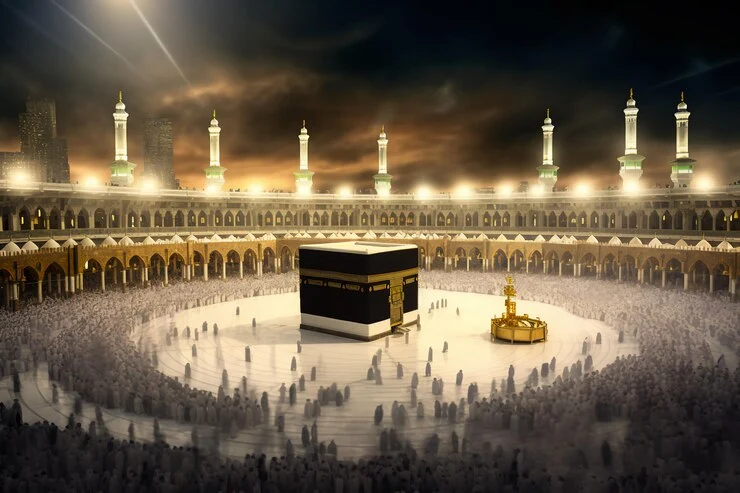Umrah Under the Stars: Nighttime Reflections and Rituals
When the sun sets and the night blankets the holy city of Mecca, a unique and spiritually enriching experience awaits the pilgrims who embark on the sacred journey of Umrah. The nighttime reflections and rituals during Umrah hold a special place in the hearts of believers, offering a serene atmosphere for contemplation, devotion, and connection with the Divine. In this article, we delve into the captivating world of Umrah under the stars, exploring the rituals, significance, and personal reflections that make this experience truly unforgettable.
Introduction
Umrah, often referred to as the “lesser pilgrimage,” holds immense significance in Islam. Unlike the obligatory Hajj pilgrimage, Umrah can be performed at any time of the year. One of the most spiritually charged moments of Umrah is experiencing the rituals under the night sky, where the ambience is serene and the devotion palpable.
The Spiritual Significance of Nighttime Umrah
Performing Umrah at night carries a sense of tranquility and humility. The night is often associated with stillness, a time when distractions fade away, allowing pilgrims to focus solely on their connection with Allah. The darkness of the night symbolizes the unknown, reminding believers of their dependence on the Creator.
Preparing for the Nighttime Umrah: A Journey of the Heart
Before embarking on the nighttime Umrah, pilgrims engage in introspection and supplication. The act of cleansing the heart through repentance and seeking forgiveness sets the tone for the spiritual journey ahead. The anticipation of approaching the holy sites and engaging in sacred rituals fills the hearts of pilgrims with a sense of awe.
The Tawaf under the Stars: Encircling the Kaaba in Reverence
The first ritual of Umrah is the Tawaf, where pilgrims circumambulate the Kaaba seven times in a counterclockwise direction. Doing so at night allows for a less crowded experience, enabling pilgrims to reflect upon the significance of the Kaaba as the focal point of unity for Muslims worldwide.
Sa’i: The Ritual of Running between Safa and Marwah
The Sa’i is a symbolic reenactment of Hagar’s search for water for her son Isma’il. Pilgrims walk and jog between the hills of Safa and Marwah, emulating Hagar’s determination and faith. Performing Sa’i at night amplifies the emotional connection to this powerful story of trust and Divine providence.
Moments of Reflection: Standing Vigil on the Plains of Arafat
One of the most crucial days of Hajj is spent in Arafat, where pilgrims stand in supplication, seeking forgiveness and mercy. This moment of standing vigil carries profound significance, and doing so at night under the open sky intensifies the spiritual experience.
The Symbolism of Stoning the Devil at Muzdalifah
In Muzdalifah, pilgrims collect pebbles for the symbolic stoning of the Devil. This ritual represents the rejection of evil temptations. Performing this act at night allows pilgrims to engage with its symbolism on a deeper level, as they cast away their inner struggles and reaffirm their commitment to righteousness.
Mornings of Remembrance: Offering Fajr Prayer in Muzdalifah
As the night transitions into dawn, pilgrims gather in Muzdalifah to offer the Fajr (dawn) prayer. The juxtaposition of the quiet night with the call to prayer at dawn highlights the cyclical nature of life and the importance of remaining steadfast in devotion.
Returning to Mina: A Continuation of the Stoning Rituals
After Muzdalifah, pilgrims return to Mina to complete the stoning rituals. The act of stoning the pillars represents defiance against the Devil’s attempts to lead believers astray. Performing this ritual under the stars reinforces the concept of light triumphing over darkness.
Tawaf al-Wida: A Farewell Circumambulation of the Kaaba
Before leaving Mecca, pilgrims perform the Tawaf al-Wida, bidding farewell to the Kaaba. This ritual symbolizes the end of a transformative journey and serves as a reminder of the eternal connection between believers and the House of Allah.
The Illuminating Power of Night Prayers at the Grand Mosque
The nights in Mecca are illuminated not only by the stars but also by the vibrant prayers at the Grand Mosque. Engaging in night prayers adds an extra layer of spiritual intimacy, as pilgrims commune with Allah in the quietude of the night.
Personal Transformation: Stories from Pilgrims
Pilgrims often return from Umrah with stories of personal transformation. The nighttime rituals foster introspection and self-awareness, leading to a renewed sense of purpose and a commitment to living a life aligned with Islamic values.
Cleansing the Soul: Ablution and Purification Rituals
The physical act of purification through ablution is integral to the Umrah experience. Performing ablution at night symbolizes the cleansing of the soul and the preparation to stand before Allah with a heart free from impurities.
A Night of Forgiveness: Laylat al-Qadr and Umrah
The auspicious Night of Decree (Laylat al-Qadr) falls within the last ten nights of Ramadan. Combining the blessings of Laylat al-Qadr with the spirituality of Umrah can lead to a night of profound forgiveness and blessings.
Carrying the Essence Home: Keeping the Spirit of Umrah Alive
As pilgrims return to their homelands, the essence of Umrah remains alive within them. The lessons learned, the prayers offered, and the spiritual connections made during Umrah continue to guide their lives, inspiring them to be better individuals and contributing members of their communities.
Conclusion
Umrah under the stars is a journey of the soul—a chance to seek closeness to Allah, reflect on one’s purpose, and emerge as a spiritually rejuvenated individual.

